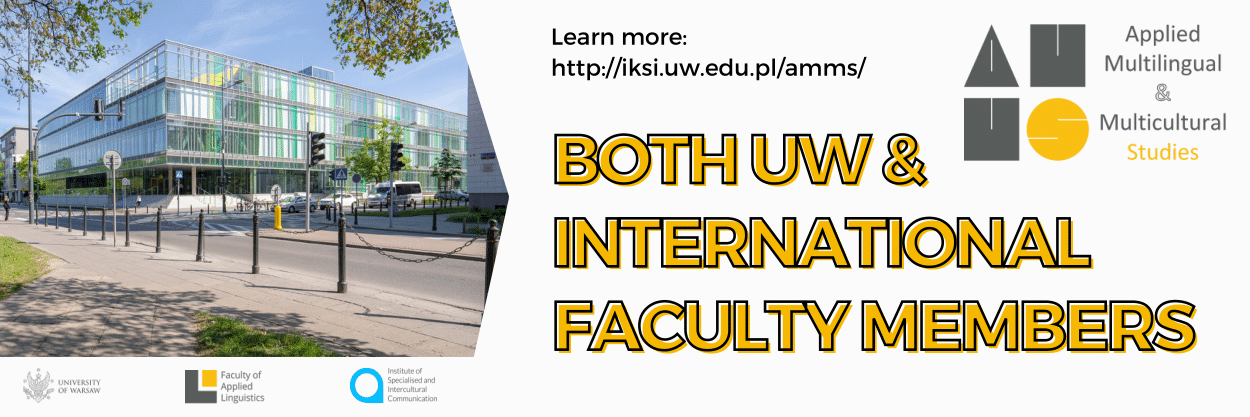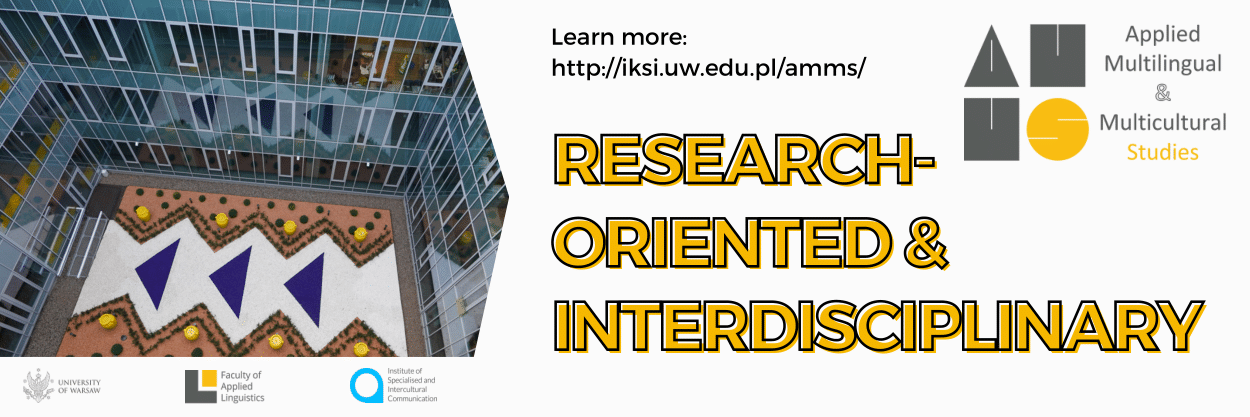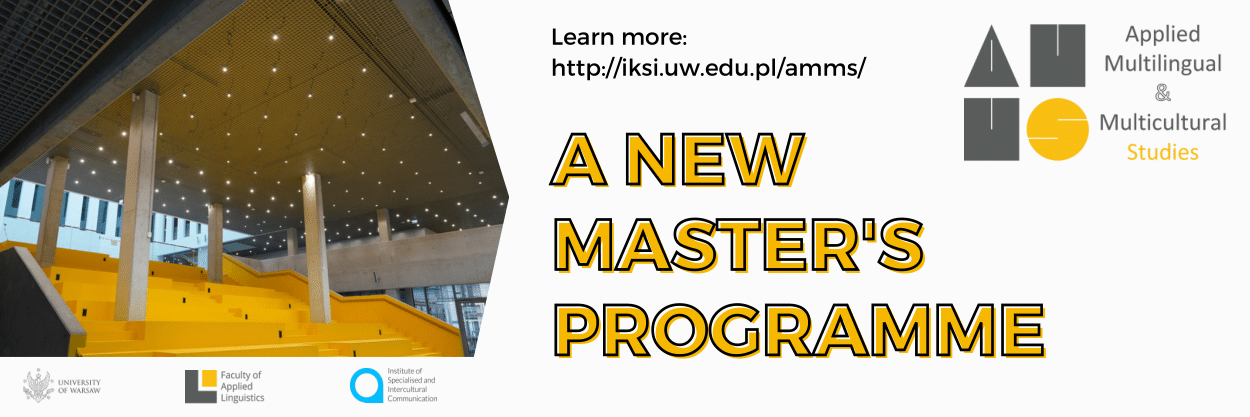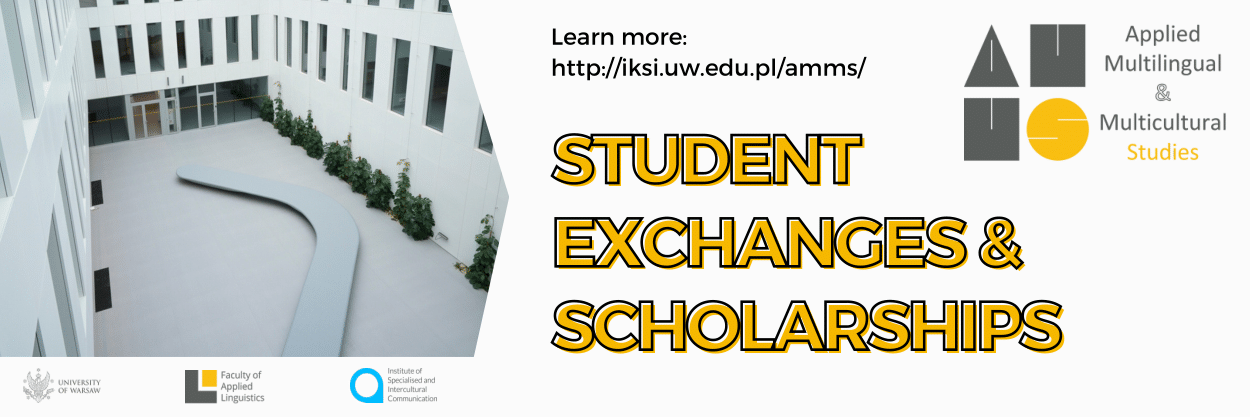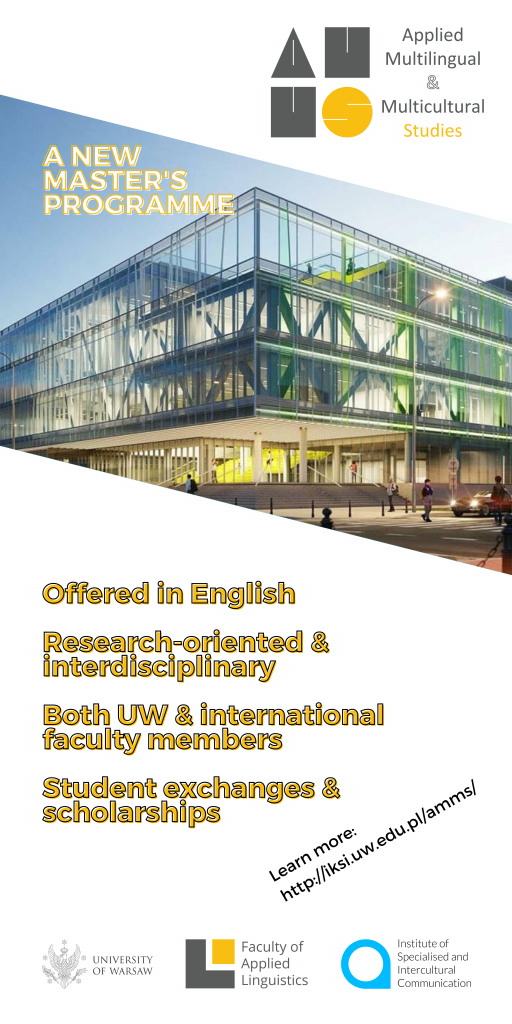Nasz program umożliwia studentom modelowanie własnej ścieżki kształcenia. Oferujemy zajęcia do wyboru, dzięki którym student ma możliwość rozwijania swoich zainteresowań oraz skupiania się na pogłębionym studiowaniu wybranego zakresu badawczego. Ponadto, aby bardziej zindywidualizować ścieżkę kształcenia oferujemy dofinansowanie i stypendia na wizyty studyjne w najlepszych ośrodkach Europy prowadzących badania w zakresie wielojęzyczności i wielokulturowości, takich jak: University College London, Uniwersytet w Oslo, Uniwersytet Kraju Basków, gdzie przez okres tygodnia studenci kształcą się pod okiem najlepszych naukowców.
Dużym atutem studiów na kierunku Applied Multilingual and Multicultural Studies jest mobilność polegająca na realizacji zagranicznych studiów częściowych w ramach programu Erasmus+ lub programu Eurocampus. Wyjazdy stypendialne studentów kierunku AM&MS są integralnym elementem studiów, dzięki czemu kierunek wyróżnia się wysokim stopniem umiędzynarodowienia.
Studia odwołują się do tradycji szkoły lingwistyki stosowanej istniejącej na Uniwersytecie Warszawskim od ponad 50 lat. Ponadto część zajęć prowadzić będą wybitni specjaliści z innych polskich uczelni oraz zagranicznych ośrodków badawczych.
Absolwenci tego kierunku będą mogli pracować jako konsultanci ds. polityki językowej (np. w agencjach regionalnych, w ministerstwie, dla rządu, w strukturach UE), czy doradcy krajowych i międzynarodowych organizacji rządowych i pozarządowych. Mogą także zostać ekspertami w zakresie wielojęzyczności i wielokulturowości w edukacji, w firmach, centrach dla emigrantów.
Harmonogram letniej sesji egzaminacyjnej Pobierz
- Warunkiem wzięcia udziału w postępowaniu rekrutacyjnym na studia jest przedstawienie przez kandydata dyplomu ukończenia studiów wyższych na kierunku: filologia angielska lub lingwistyka stosowana, studia filologiczno-kulturoznawcze, nauczanie języków obcych (język angielski jako język B).
- Jeżeli kandydat nie posiada dyplomu z żadnego z wymienionych w points 1. kierunków studiów, składa dyplom dowolnego kierunku studiów z tytułem licencjata, inżyniera lub magistra oraz odpowiedni certyfikat językowy potwierdzający znajomość języka angielskiego na poziomie B2 lub wyższym wg ESOKJ: University of Cambridge ESOL Examinations (B2 First, C1 Advanced, C2 Proficiency), lub Educational Testing Service (TOEFL), lub British Council (IELTS).
Sposób przeliczania punktów:
Kandydat może zdobyć maksymalnie 100 points
- sposób przeliczania ocen z dyplomu dla kandydatów posiadających dyplom ukończenia stacjonarnych lub niestacjonarnych studiów I stopnia na kierunku: filologia angielska lub lingwistyka stosowana, studia filologiczno-kulturoznawcze, nauczanie języków obcych (język angielski jako język B)
- bardzo dobra (5) –100 points
- dobra plus (4+) – 92,5 points
- dobra (4) – 85 points
- dostateczna plus (3+) – 72,5 points
- dostateczna (3) – 60 points
- sposób przeliczania ocen z certyfikatu dla kandydatów posiadających dyplom ukończenia studiów innych niż wymienione w points 1:
- University of Cambridge ESOL Examinations:
- B2 First — ocena A (80 points) lub B (70 points)
- C1 Advanced — ocena A (90 points) lub B (80 points) lub C (70 points)
- C2 Proficiency — ocena A (100 points) lub B (90 points) lub C (80 points)
- Educational Testing Service (TOEFL):
- B2 — 60 points
- C1 — 80 points
- C2 — 100 points
- British Council (IELTS):
- B2 — 60 points
- C1 — 80 points
- C2 — 100 points
Jeżeli więcej niż jeden kandydat uzyska najmniejszą liczbę punktów kwalifikujących do przyjęcia na studia, a przyjęcie wszystkich tych kandydatów spowodowałoby przekroczenie limitu miejsc, ocena z dyplomu zostanie przeliczona z zastosowaniem współczynnika 1,2.
Kandydaci z dyplomem zagranicznym
Obowiązują takie same zasady, jak dla kandydatów z dyplomem uzyskanym w Polsce. Oceny kandydatów z dyplomem zagranicznym zostaną odpowiednio przeliczone i przyrównane do skali ocen obowiązującej na Uniwersytecie Warszawskim.
Sprawdzenie kompetencji kandydatów do studiowania w języku angielskim
Sprawdzenie kompetencji kandydatów odbywa się poprzez weryfikację złożonych dokumentów.
Nieprzedstawienie (niewczytanie na konto rejestracyjne kandydata w systemie IRK) dyplomu ukończenia studiów wyższych lub certyfikatu językowego w terminie rejestracji na kierunek studiów powoduje przyznanie 0 (zera) punktów z całości postępowania kwalifikacyjnego i dyskwalifikację kandydata.
Our programme allows students to model their own learning path. We offer elective courses to choose from, thanks to which students have the opportunity to develop their interests and focus on in-depth study of the selected research field. In addition, in order to individualise the learning path, funding and scholarships for one-week study visits to the best European research centres working in the field of multilingualism and multiculturalism, e.g., University College London, the University of Oslo, the University of the Basque Country, will be provided so that students are also given an opportunity to be educated under the supervision of the best researchers.
A great advantage of the programme Applied Multilingual and Multicultural Studies is mobility consisting in carrying out part-time studies abroad under the Erasmus+ programme or the Eurocampus programme. Mobility of AM&MS students is an integral element of the programme, thanks to which the programme is characterised by a high degree of internationalisation.
The programme relates to the tradition of the school of applied linguistics existing at the University of Warsaw for over 50 years. Moreover, some of the classes will be conducted by outstanding specialists from other Polish universities and foreign research centres.
Graduates of this programme will be able to work as language policy consultants (e.g., in regional agencies, in the ministry, for the government, in EU structures), or as advisors to national and international governmental and non-governmental organisations. They can also become experts in multilingualism and multiculturalism in education, companies, as well as centres for immigrants.
- In order to participate in the recruitment procedure, a candidate must present a degree certificate in the field of: English Philology or Applied Linguistics, Philology and Cultural Studies, Teaching Foreign Languages (English as a B Language).
- If the candidate cannot submit a degree certificate in any of the fields listed in point 1., they submit a degree certificate of any field of study (BA, BSc, MA, MSc) and an appropriate language certificate confirming their knowledge of English at B2 level or higher according to CEFR, e.g. University of Cambridge ESOL Examinations (B2 First, C1 Advanced, C2 Proficiency), or Educational Testing Service (TOEFL), or British Council (IELTS).
The method of converting points:
- A candidate can earn a maximum of 100 points. The method of converting grades for candidates with a degree certificate (full-time or part-time first-cycle studies in the field of: English Philology or Applied Linguistics, Philology and Cultural Studies, Foreign Language Teaching (the latter three with English as Language B) is as follows:
- very good (5) -100 points
- good plus (4+) – 92.5 points
- good (4) – 85 points
- sufficient plus (3+) – 72.5 points
- satisfactory (3) – 60 points.
- The method of converting grades from a language certificate for candidates with a degree certificate other than those listed in point 1 is as follows:
- University of Cambridge ESOL Examinations:
- B2 First — Grade A (80 points) lub B (70 points)
- C1 Advanced — Grade A (90 points) lub B (80 points) lub C (70 points)
- C2 Proficiency — Grade A (100 points) lub B (90 points) lub C (80 points)
- Educational Testing Service (TOEFL):
- B2 — 60 points
- C1 — 80 points
- C2 — 100 points
- British Council (IELTS):
- B2 — 60 points
- C1 — 80 points
- C2 — 100 points
If more than one candidate obtains the lowest number of points qualifying for admission to the programme, and the admission of all these candidates would result in exceeding the limit of available places, the degree certificate grade will be recalculated using the conversion factor 1.2.
Candidates with a foreign degree certificate
The same rules apply as for candidates with a degree certificate obtained in Poland. The grades will be appropriately recalculated and compared with the grading scale applicable at the University of Warsaw.
Checking the competencies of candidates to study in English
The candidates’ competencies are checked by verifying the submitted documents.
Failure to present (not uploading the required candidate’s documents into the registration account in the IRK system) a degree certificate or a language certificate within the registration deadline for the field of study results in awarding 0 (zero) points in the entire qualification procedure and disqualification of the candidate.

